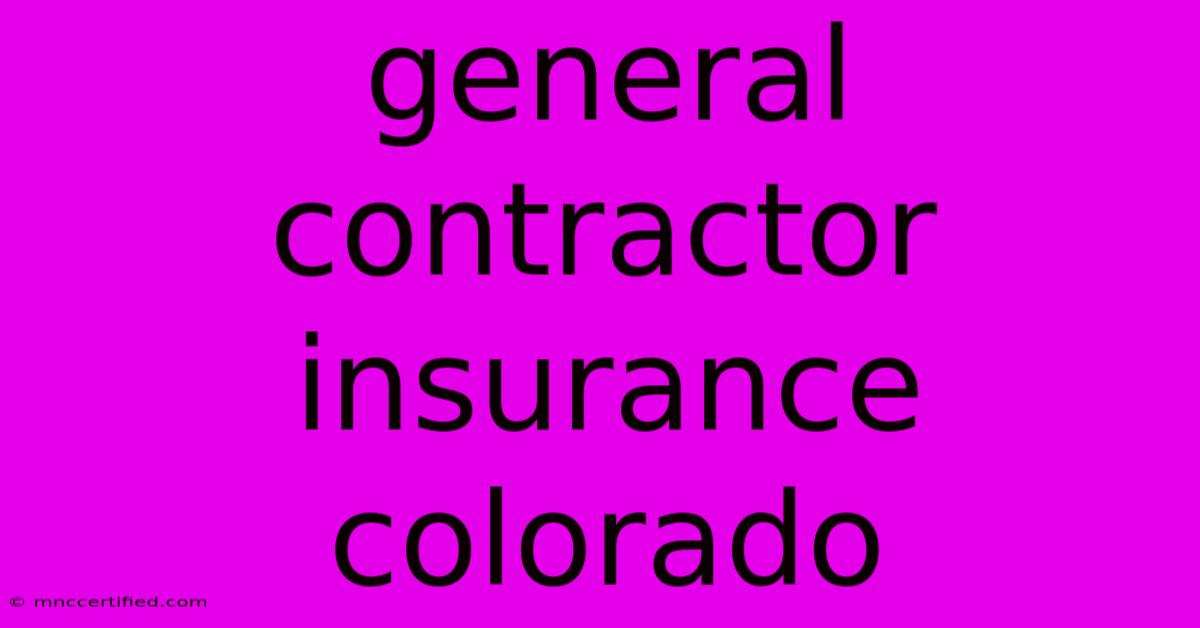General Contractor Insurance Colorado

Table of Contents
Navigating the Complex World of General Contractor Insurance in Colorado
As a general contractor in Colorado, you're responsible for a lot. From managing projects to ensuring safety on the job site, the demands are high. One crucial aspect you can't afford to overlook is general contractor insurance. This comprehensive coverage acts as your safety net, protecting your business and personal assets from financial ruin in the event of accidents, lawsuits, or other unforeseen circumstances.
This guide will delve into the essential aspects of general contractor insurance in Colorado, outlining the different types of coverage, key considerations, and tips for securing the right policy for your specific needs.
Understanding the Importance of General Contractor Insurance
Why is insurance so crucial for Colorado contractors? The answer is simple: risks abound in the construction industry.
- Liability: From workplace injuries to property damage, a single accident can result in substantial financial losses and legal battles.
- Property Damage: Your tools, equipment, and materials are valuable assets. Insurance safeguards against theft, vandalism, and damage from natural disasters.
- Worker's Compensation: Colorado law mandates that all contractors provide workers' compensation insurance for their employees. This coverage protects your workers in case of injuries on the job.
Essential Types of General Contractor Insurance in Colorado
1. General Liability Insurance: This core coverage is essential for all contractors. It protects your business from claims arising from bodily injury, property damage, and personal injury to third parties. For example, if a customer trips and falls on your job site, general liability insurance can cover their medical expenses and legal fees.
2. Workers' Compensation Insurance: As mentioned, this is a legal requirement in Colorado. It covers medical expenses, lost wages, and disability benefits for employees injured on the job.
3. Property Insurance: This coverage protects your business property, including tools, equipment, and materials, against damage or loss from various causes like fire, theft, or vandalism.
4. Commercial Auto Insurance: If you use vehicles for business purposes, commercial auto insurance is essential. This coverage provides protection for accidents, damage to your vehicles, and liability claims arising from accidents involving your vehicles.
5. Professional Liability Insurance (Errors and Omissions): This type of insurance safeguards your business against financial losses stemming from mistakes or negligence in your professional services. For example, if a client claims you made an error in a design or construction plan, professional liability insurance can cover the cost of legal defense and settlements.
6. Umbrella Liability Insurance: This policy provides additional liability coverage above your existing policies, offering protection for catastrophic events or lawsuits exceeding the limits of your general liability insurance.
7. Builder's Risk Insurance: This coverage protects your construction projects during the building process, providing financial protection for damage caused by accidents, natural disasters, or other unexpected events.
Choosing the Right Insurance Policy
Securing the right insurance policy requires careful consideration. Here are some crucial factors to weigh:
- Your Specific Business Needs: Assess your project types, the scope of your work, and the size of your workforce.
- The Amount of Coverage You Need: Determine the appropriate coverage limits for each type of insurance.
- Deductibles: Understand how deductibles affect your premiums and how much you would be responsible for paying out of pocket in case of a claim.
- Your Budget: Compare quotes from different insurance providers to find the most affordable options that meet your needs.
Tips for Obtaining General Contractor Insurance in Colorado
- Consult with a Licensed Insurance Agent: A reputable insurance agent can guide you through the process, assess your needs, and recommend the best policies.
- Maintain a Clean Safety Record: A history of safe work practices can lead to lower premiums.
- Stay Informed: Keep abreast of industry trends, changes in Colorado regulations, and potential changes in insurance coverage requirements.
In Conclusion
Navigating the world of general contractor insurance in Colorado can seem overwhelming. However, armed with knowledge and the right guidance, you can obtain the essential coverage needed to protect your business and its financial stability. Remember, insurance is not just a cost; it's an investment in the long-term success and security of your contracting business.

Thank you for visiting our website wich cover about General Contractor Insurance Colorado. We hope the information provided has been useful to you. Feel free to contact us if you have any questions or need further assistance. See you next time and dont miss to bookmark.
Featured Posts
-
Gauff Claims Wta Finals Title Record 4 8 Million
Nov 10, 2024
-
Real Madrid Hit By Double Injury Blow
Nov 10, 2024
-
Mississippi Homeowners Insurance Laws
Nov 10, 2024
-
Indiana Life Insurance Exam Questions
Nov 10, 2024
-
Wife Speaks Amid Hogg Abuse Allegations
Nov 10, 2024